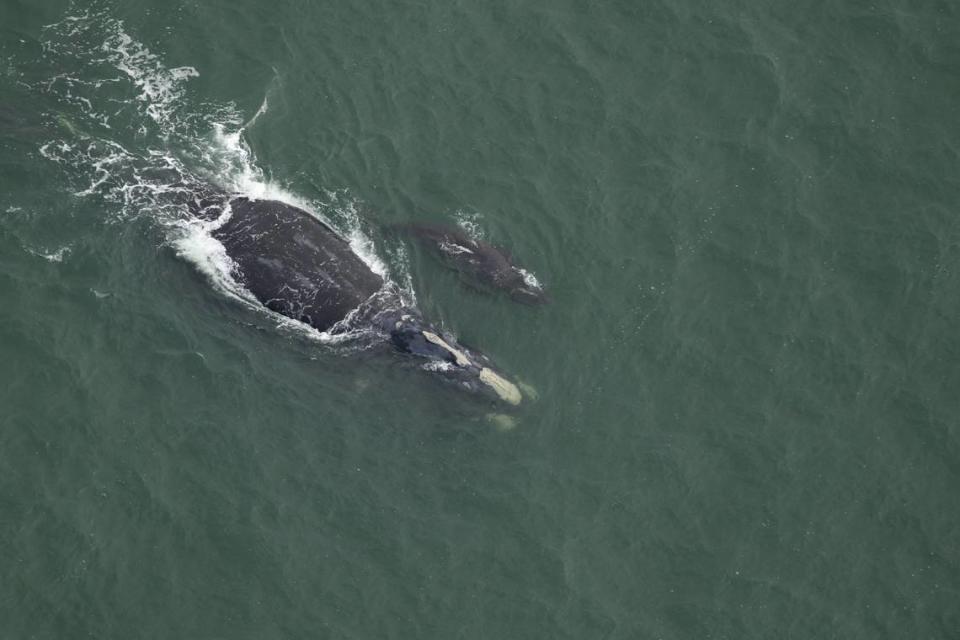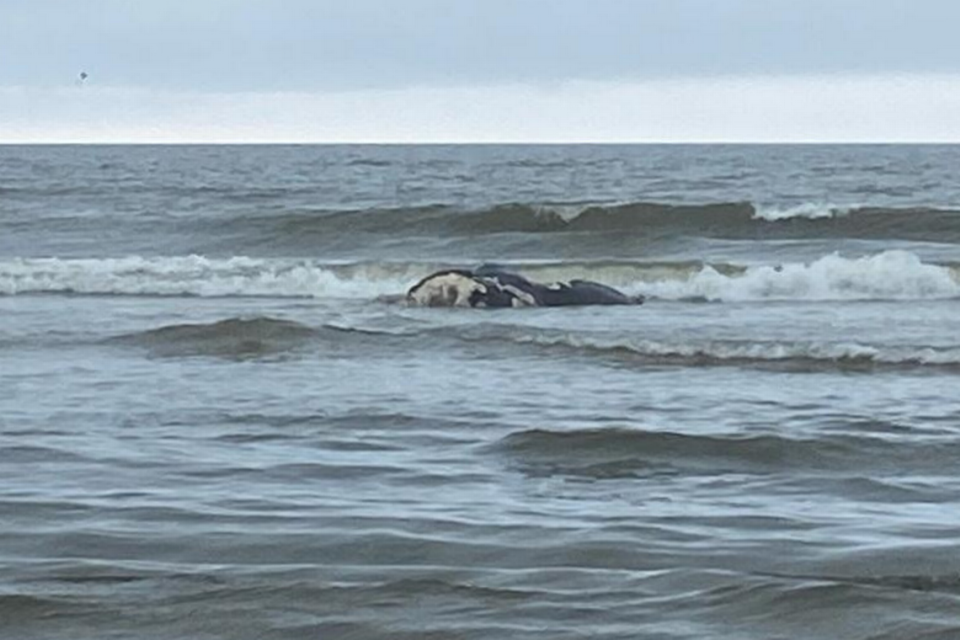First right whale calf of the season found dead off GA coast. Here’s what happened
After two months of suffering through boat-strike wounds, the calf of the first mother-baby right whale pair of the season was found dead off the coast of Georgia.
The National Oceanic and Atmospheric Administration got word of the calf death Sunday, according to the federal agency. Shortly after, NOAA, the Georgia Department of Natural Resources and the Florida Fish and Wildlife Conservation Commission, identified the shark-scavenged whale carcass as the injured calf of North Atlantic right whale “Juno.”
Juno’s baby never “made it out of the nursery,” said Kathleen Collins, Senior Marine Campaign Manager at International Fund for Animal Welfare (IFAW).
“It suffered a slow, agonizing death for half its short life,” she said.
Juno and her baby were first spotted during a Nov. 24 Clearwater Marine Aquarium Research Institute flight survey. Scientists observed the mama and baby right whales off the coast of South Carolina and deemed them the first pair sighted in the 2023-2024 calving season.

In early December, the Georgia Department of Natural Resources’ Wildlife Resources Division narrowed the calf’s age to less than 2 weeks. But a month later, hope for the newborn calf quickly turned into tragedy.
On Jan. 3, the baby had propeller-wound injuries on its head, mouth and left lip. These specific types of wounds the calf sustained are particularly problematic because they can affect the whale’s ability to successfully nurse, biologists said.
A week later, NOAA Fisheries biologists preliminary determined the injuries met “serious injury” criteria and were consistent with a vessel strike. They predicted the young whale was likely to die. The calf’s death is the 39th mortality of the endangered species in the ongoing Unusual Mortality Event
Juno’s calf is the third North Atlantic right whale to die in a little over a month.
A dead juvenile North Atlantic right whale, born in 2022 to mother Pilgrim, was seen Feb. 13, floating offshore of Savannah, Georgia, according to NOAA.
On Jan. 28, a female North Atlantic right whale was found dead near Joseph Sylvia State Beach on Martha’s Vineyard, Massachusetts. The whale, born during the 2023 calving season to mother Squilla, had rope entangled around and embedded in her tail. NOAA Fisheries determined the rope was consistent with that used in Maine state water trap/pot buoy lines.
The deaths of Juno, Pilgrim and Squilla’s calves show the stark and devastating realities for the species.
Lagging speed-reduction law changes
Currently, there are about 360 North Atlantic right whales remaining. Fewer than 70 females can reproduce, a population that is not high enough to account for increasing moralities.
When the gentle giants leave their summer homes in New England for their winter stays off the coasts of Florida and the Carolinas for their calving grounds, they are susceptible to boat strikes and entanglement, particularly in heavily industrialized shipping waters. Savannah and Charleston’s ports can be dangerous for migrating right whales, a place where large ships are cautioned to slow at the sight of these mammals, but don’t always obey the warning.
Research led by the IFAW found that between 2003 and 2018, 88.4% of determinable North Atlantic right whale deaths were caused by vessel strikes and entanglement.
“Human activity has set this species on a collision course with extinction,” said Greg Reilly, IFAW’s Southeast Marine Campaigner. “With an amended vessel speed rule, this death may never have happened.”
Current federal law designates spots — Seasonal Management Areas — off the coasts of northeast Florida, Georgia, South Carolina and North Carolina where speed restrictions apply. It says that all vessels 65 feet or greater must travel at 10 knots or less between Nov. 1 and April 30 in Seasonal Management Areas. But experts say the majority of calves that have died recently have been struck by smaller vessels that federal law regulates.

Sarah Sharp, an animal rescue veterinarian with IFAW, said in January that Juno’s calf’s injuries were that caused of by a vessel with a smaller propeller, not one of a ship, according to previous Island Packet reporting.
In 2022, NOAA proposed changes that would apply speed restrictions to all vessels 35 feet and greater.
Boating United, a nationwide nonprofit, wrote to the Biden Administration in August 2022 to oppose NOAA’s proposed regulations. Changing vessel speed restrictions along the Atlantic coast, would “pose major consequences for the $170 billion recreational boating and fishing industry,” the letter read.
“It is not safe to require boaters to travel at this speed and spend long periods of time on the water in potentially unsafe conditions,” the nonprofit said. “Our industry contributes over 690,000 jobs and supports 30,000 small businesses – many of which are in jeopardy should NOAA’s rule move forward as currently written.”
While the federal administration and advocates push to strengthen the speed-reduction law, research shows that many boaters defy current regulations.
Compliance rates of Savannah and Charleston harbors are “consistently below 5%,” according to marinewhale.com.
“The only thing worse than the injuries sustained by this whale is the negligence and inaction by our government,” Reilly said.

